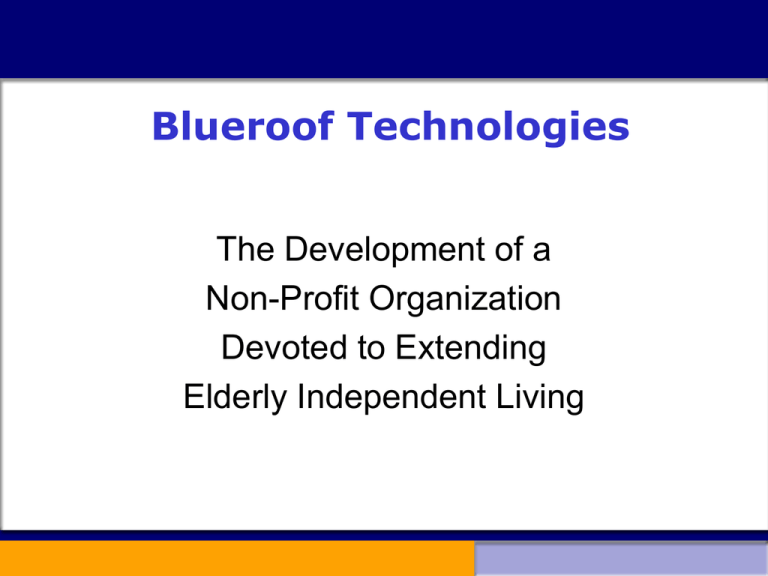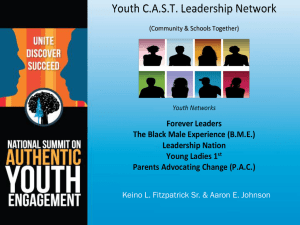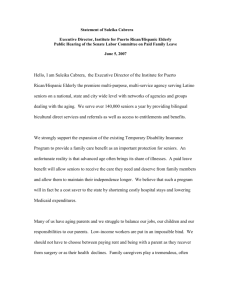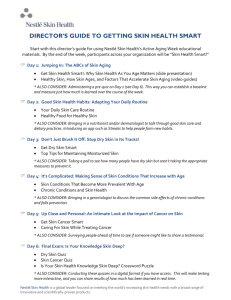BlueroofPresentation, presentation
advertisement

Blueroof Technologies The Development of a Non-Profit Organization Devoted to Extending Elderly Independent Living Blueroof Mission Mentoring Youth Training Employment Live and work in McKeesport Blueroof Senior Smart house Smart products Entrepreneurship Senior Citizens Housing Computer Training Remain in community Blueroof Technologies Inc, is a non-profit corporation that will use innovation, invention and entrepreneurship to help senior citizens remain at home in their communities and to provide youth the opportunity to train and become responsible and productive citizens. The main components of Blueroof Technologies are: · Economic Development · Smart House Technology · Housing for Seniors · Technical Education for youth · Entrepreneurship Blueroof Technologies •Concepts began as result of findings uncovered by a Allegheny General Hospital Community Project •Germinated an idea of combining technology with practicality City of McKeesport •Population: 24,000 •Unemployment rate: 7.2 % (PA is 6.1%) •Subsidized housing: 20% •Seniors (over age 60): 25 % •NORC: naturally occurring retirement community The McKeesport Aging Program A Collaboration Between Center for Neurosciences Research, Allegheny General Hospital and UPMC McKeesport, UPMC Health System MAP Staff • Robert T. Rubin, M.D., Ph.D., Principal Investigator • Director, Ctr. Neurosci. Res., Allegheny General Hospital • Sharyn A. Gesmond, R.N., M.S.N., Research Nurse • MAP Office, UPMC McKeesport • Lisa L. Long, Ph.D., Research Psychologist • MAP Office, Allegheny General Hospital • Barry L. Farkas, M.D., M.P.H., Co-Investigator • Independent Researcher History - MAP • Started in 1997, supported by an endowment from an anonymous community donor • Mandate is to investigate community aspects of aging and neurodegenerative diseases affecting independent living of seniors • McKeesport and White Oak selected as sites because of demographics of seniors (2000 census): • McKeesport: 21% ≥ 65 years • 72% Caucasian, 25% African-American, 3% Other • White Oak: 24% ≥ 65 years • 98% Caucasian, 2% African-American • Clairton, at their request, recently joined MAP Keeping Elders Safe in Their Homes • Three-part study designed to enhance independent living for older adults; i.e., keep them safe in their homes for as long as possible • • • • Benefits their physical and emotional well-being Enhances quality of life Reduces risk of accidents and injuries Reduces Medicare expenditures • In last two years, UPMC McKeesport had 141 admissions age ≥ 60 for hip fracture and replacement • Total Medicare payments = $2,141,288 or $15,186 per patient, not including after-care (skilled nursing facility, physical therapy, etc.) Keeping Elders Safe in Their Homes – Phase I • Five-year retrospective review of police and fire department records for contacts by seniors • Completed to date (May 2002) • McKeesport Fire Department: all 5 years; 5,696 records reviewed; 98 incidents determined • 2/3 were smoke-related; most were burnt food forgotten on stove • White Oak Police Department: all 5 years; 25,655 records reviewed; 338 incidents determined • ~ 20% vandalism; ~ 10% confusion, wandering; ~ 10% home theft; ~ 10% DOA; ~ 2% intoxication, DUI • McKeesport Police Department: 3 years; 21,816 records reviewed; 1,090 incidents determined • ~ 25% vandalism; ~ 20% home theft; ~ 10% DOA; ~ 6% intoxication, DUI Keeping Elders Safe in Their Homes – Phase II • In-Home Safety Surveys for seniors in independentliving arrangements (houses, apartments) • Room-by-room assessment of electrical, gas, heating, lighting, smoke alarms, fire-protection, ambulation hazards, home security, emergency notification methods, general home repair • As of August 2002, 168 seniors included: • 102 Caucasian and 29 African-American (22%) women • 27 Caucasian and 10 African-American (27%) men • Preliminary findings indicate need for fall risk-reduction (e.g. stair treads, grab bars), bathroom accessibility, improved fire safety (e.g. working smoke alarms), improved home security (e.g. glass-block windows), improved outside access (e.g. handicapped ramps) Keeping Elders Safe in Their Homes – Phase III • In-Home Personal Health Assessments for seniors in independent-living arrangements (houses, apartments) • Personal and family medical history, review of systems, current medications (Rx’ed and OTC), physical and cognitive status (MMSE, clock drawing), ADLs (including driving), health habits (nutrition, exercise, sleep, smoking, alcohol, MD visits, financial (health insurance, living will, advance directives, food assistance), family/social activities, use of available senior programs • As of August 2002, 170 seniors included (Phase II + 2) • Preliminary findings indicate need for depression screening, ADL assistance (e.g. shopping), more social contacts, wills/advance directives, education about Rx’ed medications and community programs Giving Back to the Community – I MAP Participants and Community at Large • All Phase II/III participants given a package containing two 60-watt light bulbs, two night lights, flashlight with batteries, smoke detector (if needed), baking soda (for stove fires), non-skid bathtub mat, compartmentalized pill box, rubberized bottle opener, ruler with magnifying glass, pen, pencil, key chain with MAP telephone number, home safety and Senior Citizens Against Crime booklets • In 2000, three open community evening programs held at McKeesport High School • Aging Well • Community Safety for Seniors • Common Problems in Aging: Medical and Legal Concerns Giving Back to the Community – II Home Improvements • Home improvements accomplished for 34 sites, based on deficiencies identified in Phase II study; several other sites awaiting availability of funds • Electrical upgrades, grab bars, access ramps, glass block windows, new bathrooms, roof repairs, etc. • Basic support ($2500) from McKeesport Community Development Block Grant, now entering its third year • Additional support from other community agencies (Action Housing, McKeesport Housing Corporation, Nazareth Housing Services, Twin Rivers Council of Governments) Giving Back to the Community – III Personal Health Improvements • Personal-health improvements targeted for Phase III participants • Referral to primary-care physicians for identified health problems, lack of vaccinations • Referral to social-service agencies and programs • • • • • • Allegheny County Area Agency on Aging (ADL assistance) Meals-on-Wheels Local community senior facilities and food-bank services Property-tax rebate programs Utility company energy-assistance programs Given Neighborhood Legal Services Association pamphlet on elder-law (wills, advance directives, financial issues) MAP Collaborations – I • Clinical Epidemiology of Dementia in General Practice National Institute on Aging, AG16705, 4/99 – 3/04 Mary Ganguli, M.D., M.P.H., UPMC / WPIC, P.I. • Assessing workup and diagnosis of dementias in primary-care-practice patients in relation to their functional impairments • The earlier the diagnosis and treatment of incipient dementias, e.g. Alzheimer’s disease, the longer seniors can remain in independent-living arrangements MAP Collaborations – II • McKeesport Center for Smart Aging Robert A. Walters, P.E.., PSU McKeesport • Develop business and research center for “smart” products for seniors • Design and build McKeesport Senior Smart House; retrofit existing senior housing • Energy management, video monitoring and conferencing for health and safety • MAP can detail home-safety and personal health needs • MAP can refer independently living seniors to beta-test Smart House and as long-term residents of Smart Housing clusters • MAP can facilitate Smart House medical monitoring through UPMC McKeesport or other hospital Goals 1. Develop technology and build new homes that will keep seniors at home longer, safer and healthier 2. Provide training program for seniors in technology usage 3. Develop area for cluster of Senior Smart Homes Smart Technology • The use of computer hardware and software and Information Technology to control, monitor and optimize household appliances and systems. House built by McKeesport High School Construction Technology students Add Smart House technology to McKeesport High School homes • Must be – – – – – Low cost Low maintenance Energy efficient Adapted to senior life styles And “Wired” McKeesport Senior Smart House functions via www: • Energy Management Appliance and lighting control • Video monitoring and conferencing • Security • Safety • Health • Wellness McKeesport Senior Smart House functions via www: • Energy Management Remote adjustment of thermostat Improve efficiency • Appliance and lighting control Turn on lights remotely Stoves on/off Water left running Internet Functions • Video monitoring Who is at the front door? • Video conferencing Family, Medical, Shopping • Security Fire and smoke alarms Intrusion Internet Functions • Health Blood pressure, temperature, EKG, weight, medication, etc. • Safety Activity monitors, alert buttons and fall detectors • Wellness Diet, exercise and preventive medicine Internet Functions • “Cyber” Nurse * Visits a number of patients each day via the Internet. * Video conferencing to see and talk to patients. * Database of patient records and activity Beta House • • • • • McKeesport Aging Program house In residential area Smaller house (1000 sq ft) 2 bedrooms, slab foundation Seniors will live in house for several months • Test ideas and concepts Training for seniors in IT • Research associates • Computers and components • Computer usage-Senior computer interface • Internet usage including email • Advanced technology Develop cluster of Senior homes • Close to hospital • Share resources • Share services • Currently will be using donated land next to a senior citizen high-rise to build up to six cottages •Shown are the initial designs for the “Beta” SCS •Two-bedroom, 1000 square foot ranch •Bedrooms are oversized and all the doors and hallways are extra-wide •Bathroom is designed to handle wheelchairs, with extra space around the fixtures and appliances Smart Cottage for Seniors (Conceptual) FRONT VIEW Wiring TALK / DATA TALK DSL Modem RS CS TR RD TD CD Router/Firewall Switching Hub w/ VPN CISCO SYSTEMS Internet Residence Server 7x 8x 9x 1x 2x 3x 10x 11x 12x 7x 8x 9x 4x 5x 6x 1x 2x 3x 10x 11x 12x 4x 5x 6x C 7 8 9 101112 A 12 34 56 A B Switching Hub 24 Port House W iring Contros SIDE A Ethernet Ethernet UPS 7x 8x 9x 1x 2x 3x 10x 11x 12x 7x 8x 9x 4x 5x 6x 1x 2x 3x 10x 11x 12x 4x 5x 6x C 7 8 9 101112 A 1 2 34 56 A B House W Iring Controls SIDE B Switching Hub 24 Port Wiring The connected home Technology Components McKeesport Senior Smart Cottage “SMART” functions Energy Management Remote adjustment of thermostat Improve efficiency Automatic cutback Appliance and lighting control Video monitoring Turn on lights remotely Stoves on/off Water left running? Who is at the front door? Video conferencing Family, Medical, Shopping Security Fire and smoke alarms Intrusion-all windows and doors Health Blood pressure, temperature, EKG, weight, medication management and recording, pacemaker monitoring, cholesterol testing – IP connected Safety Activity monitors, alert buttons and fall detectors Wellness Diet, exercise and preventive medicine Cyber Nurse Visits a number of patients each day via the Internet. Video conferencing to see and talk to patients. Database of patient records and activity Guaranteed power for two outlets in the house for emergency operation of critical medical equipment. Propane UPS for every two houses AC power emergency outlets Research Center Current Participants • State of Pennsylvania – Lt Gov. Baker-Knoll • Allegheny Hospital McKeesport Aging Project • FBI Community Outreach Program • Allegheny County Sports & Exhibition Authority • Manchester Craftsmen’s Guild • Office of U.S. Senator Rick Santorum • Hanson Design Group Architects



